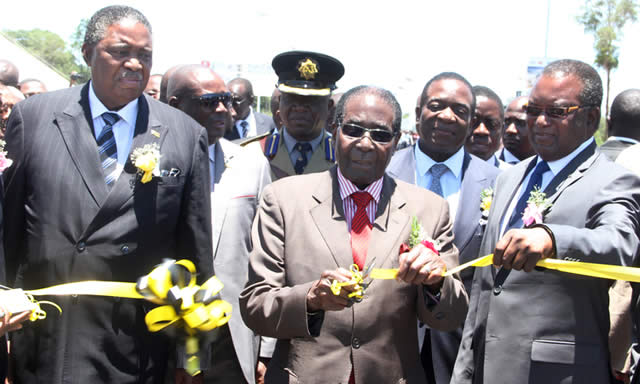President’s fury at shoddy roadworks


President Mugabe cuts the ribbon officially opening the Harare International Airport Road flanked by his deputies Cdes Emmerson Mnangagwa and Phelekezela Mphoko (left), Transport and Infrastructural Development Minister Joram Gumbo and other dignitaries in Harare yesterday. — (Picture by Justin Mutenda)
Zvamaida Murwira Harare Bureau—
PRESIDENT Robert Mugabe yesterday said sub-standard work on infrastructure development by contractors will never be tolerated and that there should be insistence from officials that such projects be of high quality and durable. Speaking at the commissioning of Harare International Airport Road, President Mugabe said only qualified contractors should be engaged for such jobs.
“Clearly, infrastructure development is expensive, hence whenever we undertake such projects we must demand that the product be of high quality, durable and give good value for money once completed,” he said. “Sub-standard work should never be tolerated. In this regard, we must always ensure that qualified contractors are engaged and that they are strictly supervised to guarantee acceptable results.”
This came as Transport and Infrastructural Development Deputy Minister Michael Madanha revealed in Parliament yesterday that there was poor workmaship on the $206 million rehabilitation of the 820-kilometre Plumtree-Mutare Highway by Infralink.
Infralink was a joint venture between Group Five International of South Africa and the Zimbabwe National Roads Administration. Speaking during a question and answer session in the National Assembly, Deputy Minister Madanha said the government had since ordered the firm to re-do various sections of the highway at its own expense.
He said government policy stipulated that the contractor would have to foot the costs to address defects identified on a project. He was responding to a question from Mutasa South MP Cde Irene Zindi (Zanu-PF) on what government policy was on mediocre work given that the Plumtree-Mutare Road was being patched up barely a few months after it had been completed.
“It’s something very visible that some sections that have been rehabilitated are showing signs of failure,” said Deputy Minister Madanha. “There are many reasons for that, but the major reason is lack of supervision. The policy is that the contractor should address all defects at his own cost.”
Legislators questioned why the government settled for Group Five for the project and why the firm did a shoddy job in Zimbabwe when it was renowned for doing splendid work in South Africa.
“The actual issue is poor workmanship, supervision is there, engineers are there,” said Deputy Minister Madanha. “Definitely as a ministry we’ve seen that something was amiss with the road. We’re now taking corrective measures to ensure that whoever was responsible must address it at his own cost.”
At the commissioning of Airport Road, President Mugabe said it was one of the notable infrastructure projects commissioned to date within the context of Zim-Asset. “That is commendable and should spur the relevent Zim-Asset cluster, the Ministry of Transport and Infrastructural Development and Zinara on, as we finalise plans to start other major projects, including the long-awaited Beitbridge-Harare-Chirundu Road, whose roll-out the whole nation eagerly awaits,” he said.
“On a related note, as a nation we should now collectively fight to put an end to vandalism of our infrastructure. It is totally unacceptable that after completion of such a high quality project, road signage and other road furniture are vandalised.
“If that scourge is not stopped forthwith, we will continue to pour money down the drain, as it were, as there will be nothing to show for the toll fees that our people pay from their hard earned cash. I, therefore, say no more to vandalism of our infrastructure.” President Mugabe said the damaging of road infrastructure had resulted in accidents, “while in some case precious lives have been lost due to road traffic accidents, following the vandalism of fences along major highways and our railway line”.
“We have also witnessed, with disbelief and disgust, the same negative energy exterted towards the destruction of telecommunications related infrastructure,” he said.
“It must be noted that there are huge economic costs associated with loss of production such as delays. May I appeal to community leaders, at all levels, to lead the campaign to preserve our national infrastructure. In most cases the perpetrators of such senseless acts of vandalism are known in our localities.”
President Mugabe said in isolated cases, such vandals held notable positions in society and yet they appeared to be getting away with their offences. He said it was commendable that funds for the construction of the Harare International Airport Road was done using funds raised by locals through paying toll fees.
“It demonstrates the resilience of our people and our economy,” he said, noting that the successful implementation of the project “should give the motoring public some consolation, if not satisfaction, that their hard-earned money is being put to good use”.
President Mugabe said he was honoured to commission the project, another anchor of Zim-Asset as Zimbabwe forged ahead with the implementation of its economic revival and turnaround blueprint. He said infrastructure development was key to economic growth and development.
“Indeed, availability of suitable and adequate infrastructure is a necessary condition for the economy to take off,” said President Mugabe. He said the Harare International Airport Road was strategic as it led to the main international airport of the country and was the first road visitors see and the last they also see on their way out.
Work on the road started in 2009 within the context of a Private Public Partnership between the Harare City Council and a private developer, Augur Investments. But the project came to a complete stop in 2013 after Augur moved off site, resulting in the government taking over through Zinara.








Comments